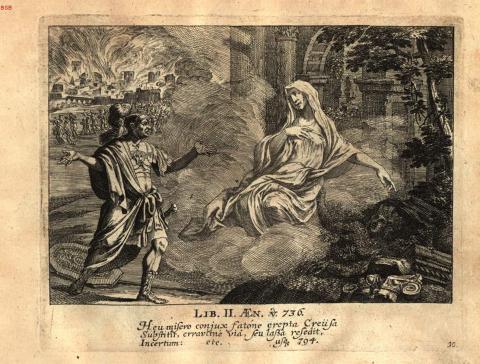Annotations
Creusa appears to Aeneas in burning Troy on a cloud and points out a princess.
Creusa erscheint Aeneas im brennenden Troja auf einer Wolke und weist auf eine Prinzessin hin. (Suerbaum)
Engraving from a German children’s picture-book version of the Aeneid by G. J. Lang and G. C. Eimmart, “A tapestry of Roman virtues as seen in Vergil’s Aeneas and his brave deeds, rendered in sparkling engravings, as illustrations of the remarkable deeds of antiquity, for the common benefit of noble youth,” (Peplus virtutum Romanarum in Aenea Virgiliano eiusque rebus fortiter gestis, ad maiorem antiquitatis et rerum lucem, communi iuventutis sacratae bono, aere renitens) (Nuremburg: J.L. Buggel, 1688), pl. 10.
Online Resources
Associated Passages
License
Creative Commons Attribution-NonCommercial-ShareAlike
Properties
Agent
Date
1688
Culture
Medium
Dimensions
21.86x16.92cm
Inscription
Lib. II. Aen. v. 736 Heu misero conjux fatone erepta Creüsa/ Substitit, erravitne via, seu lapsa resedit,/ Incertum: etc./ usque 794.
Location
Bavarian State Library, Munich
Image Credit


In the right hand background Troy burns and Trojans flee in a mass. Aeneas confronts the ghost of his wife Creusa, seated before him on a cloud. She floats in front of an old temple, the "templum vetustum desertae Cereris" mentioned in lines 713 and 714. Creusa is gesturing down to her left, showing Aeneas the shadowy image of a princess, the "regia coniunx" she mentions at 783. (Lucy McInerney)